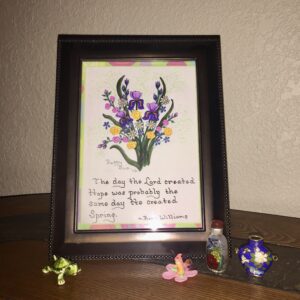 In three days, it will be three years since my husband died, and I think the grief cycle has finally run its course. Four or five months ago, I consciously thought, “I’m better.” It surprised me, and I wondered how long I had felt the relief without realizing it. It seems now I am living with sweet memories that feel like a blessing instead of a loss. I’ve never been a crier, so that’s not a benchmark, but my automatic thoughts are no longer so sad. Somehow, it seems like my future is more hopeful and robust than my past—a massive shift.
In three days, it will be three years since my husband died, and I think the grief cycle has finally run its course. Four or five months ago, I consciously thought, “I’m better.” It surprised me, and I wondered how long I had felt the relief without realizing it. It seems now I am living with sweet memories that feel like a blessing instead of a loss. I’ve never been a crier, so that’s not a benchmark, but my automatic thoughts are no longer so sad. Somehow, it seems like my future is more hopeful and robust than my past—a massive shift.
In no way am I saying I miss him less or love him less, but I accept his absence and no longer flip back and forth between Anger and Depression—the two most disturbing steps of the grief cycle and where most of us get stuck. Denial and Bargaining were gone long ago for me, and I finally know the what’s and how’s of Release. Not contemplating the loss is odd, but I welcome it like a long-lost friend. It’s not only a release but a relief.
I was ready to let go, to stop hanging onto misery as if it were an anchor, a lifesaver. The coming of spring has also been a force. The spring before she died, my youngest sister Patty sent me a hand-painted card with a bouquet and a quote by Bev Williams: “The day the Lord created hope was probably the same day he created Spring.”
I write about my grief process because I want you to know it does get better—believe and pay attention. I know there are times, often long periods when you think the black cloud over your head is all your future holds. It isn’t true. Given time and tenacity, the heavy darkness lifts one day, and you can feel the sun’s hug. Of course, the cloud comes and goes, but the time between it falling around your head and engulfing your body becomes less frequent and disturbing.
So, I leave you today with the thought of hope. So many people are experiencing loss, and loss upon loss, and we are each unique in how we survive and thrive. Losing a dear one is not what we wanted, ever, but it’s not a death sentence. Have the patience to evolve from the five-step cycle of grief, and like the wise doctor told my sister after her chemotherapy treatments and bone marrow transplant, “You’ve done all of this so that you can live–now go live.”
Hers is not the same story, but the same lesson: It’s okay to live while we live.
Until the next time: Live while you live.
Jennifer Goble, Ph.D., LPC, is the author of “My Clients…My Teachers,” and the blogger and writer of Rural Women Stories: www.ruralwomenstories.com.
Powered by WPeMatico